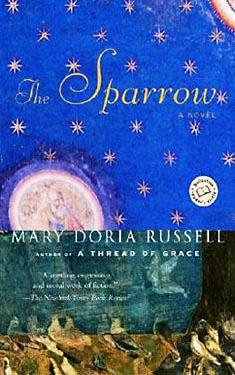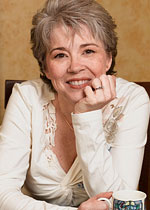Review: The Sparrow by Mary Doria Russell
This review originally appeared on my blog Tethyan Books.
 The Sparrow by Mary Doria Russell
The Sparrow by Mary Doria Russell
Published: Black Swan, 1996
Series: There is a sequel, Children of God
Awards Won: 1997 BSFA, 1998 Clarke
Awards Nominated: 1997 Campbell
One kind-of spoiler follows, which is revealed at the beginning of the first chapter.
The Book:
“When the first alien society was discovered, it was not the government of any country that sent the first expedition. Instead, the first to react was the Society of Jesus, a religious order with a long history in the exploration and study of newly discovered foreign lands. The Jesuits quickly and privately mobilized a group of eight friends and experts to make the dangerous journey to a new world.
They went not to proselytize, but to learn and to meet God’s other children. They went with the best of intentions. When the next public expedition finally arrived, they found only one of the original expedition still alive.
Emilio Sandoz—severely injured in body, mind, and soul—was unable to give any explanation for the squalor in which he was found. How could such an well-meaning expedition have gone so horribly wrong?” ~Allie (with some phrases taken from the prologue)
I decided to read The Sparrow on a whim. I remembered seeing it mentioned in a few reviews of Embassytown, as an example of a well-written book about a disastrous first contact. The Sparrow is very different from Embassytown, but I am very glad that I allowed the recommendation to steer me towards this novel. I was also surprised to learn that such a fantastic novel was actually Mary Doria Russell’s debut. There is a sequel, Children of God, which I will probably read at some point, but I think that The Sparrow is satisfying as a complete story.
My Thoughts:
The story of The Sparrow is split into two timelines. The first, the ‘past’ narrative, provides the background of the main players, and progresses through the expedition to the alien planet of Rakhat. The second timeline is the ‘present’ story, which begins after the spectacular failure of that mission. I think that the two stories, told in alternating chapters, complemented each other remarkably well. The shifting between the two storylines allowed well-employed foreshadowing and interesting alternate perspectives to enrich the experience of both. By telling the outcome of the mission from the beginning, it was clear that this was going to be more of a contemplative novel. It felt like the novel was less focused on what was going to happen next, and more involved in exploring the causes and effects of the events of the story.
I was initially a little skeptical of split-timeline approach, since I thought that knowing the expedition was doomed from the start might suck out all of the story’s tension. In practice, I found the opposite to be true, mostly because I found the cast so immensely likeable. The members of the expedition were so good intentioned and full of life that I couldn’t help but feel an odd mixture of pity and dread about their eventual fate. While I liked that they were not perfect—each had their flaws and secrets—I also found it refreshing that they were generally decent people. In the present timeline, also, I found most of the cast to be generally likeable, though a little less interesting. I couldn’t help but worry about how they would react on learning the truth of Emilio’s experiences, and what they would eventually do with him. Emilio was certainly the star of the cast, though the lifelike characters around him never seemed extraneous. Much of the story involves getting to know Emilio, his personality, and how his experiences in the novel (and before) have shaped his life and beliefs.
As a Jesuit priest, a lot of Emilio’s thoughts included considerations of faith and the society he had pledged his life to serve. Overall, this was probably one of the more positive representations of religion I’ve seen in a science fiction book. While the expedition members often discussed their faith among themselves, they were not going to Rakhat to convert ‘heathens’. They hoped to eventually share their beliefs with their alien friends, but their original intention was simply to learn more about God’s universe. Emilio’s eventual crisis of faith was one that is likely familiar, in broad outline, to any Christian. There is no easy answer to his anguish, and I appreciated how Russell managed to give the end of the story a sense of closure without forcing an unrealistically happy ending.
 The Sparrow is not a hard science fiction novel, so it is necessary to be able to accept some unrealistically optimistic science. For instance, the Society of Jesus seemed to make a star-spanning asteroid-spaceship surprisingly easily, considering that their departure was less than a decade from now. The alien planet could also conveniently support human life, and the aliens seemed very similar to the kinds of life forms to which we are accustomed. However, though they were biologically familiar, there were many things about the inhabitants of Rakhat that were very alien. Both humans and aliens made assumptions about the other that did not prove true, and these assumptions often led to disastrous consequences. I was not overly concerned with the wishful science, perhaps in part because I was so engaged by the strength of the story, the ideas, and the memorable characters.
The Sparrow is not a hard science fiction novel, so it is necessary to be able to accept some unrealistically optimistic science. For instance, the Society of Jesus seemed to make a star-spanning asteroid-spaceship surprisingly easily, considering that their departure was less than a decade from now. The alien planet could also conveniently support human life, and the aliens seemed very similar to the kinds of life forms to which we are accustomed. However, though they were biologically familiar, there were many things about the inhabitants of Rakhat that were very alien. Both humans and aliens made assumptions about the other that did not prove true, and these assumptions often led to disastrous consequences. I was not overly concerned with the wishful science, perhaps in part because I was so engaged by the strength of the story, the ideas, and the memorable characters.
My Rating: 5/5
The Sparrow is a thoughtful novel of first contact with an alien species and the disasters of misunderstanding that seem to commonly follow. It is also about Christian religious faith, and a familiar crisis of faith carried out on an alien planet. The novel follows the Jesuit priest Emilio Sandoz on his doomed mission to Rakhat, and simultaneously tells the story of his return. The characters in both timelines were well-drawn, complex, and generally decent people that I found easy to care about. The Sparrow has definitely earned a place as one of my favorite books of the year. Even though this novel does feel complete, I am going to have to put the sequel, Children of God, on my to-be-read list.



















 Full Details
Full Details


4 Comments
I happened to just start reading this book. Saving this review for later but looking forward to it.
Brenton, you are in for a real treat. The Sparrow is a wonderful book.
And, it’s read. It was spectacular, and as someone who has my own struggles with religion, I read it at the perfect time in my life.
It’s great to hear that you enjoyed it as well!
Sorry, the comment form is closed at this time.